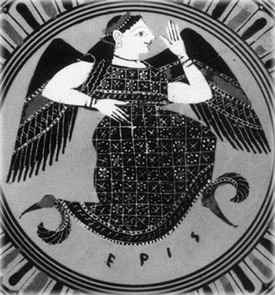Posted April 11, 2008 | Link to original
Dear Friend and Reader:
LAST NIGHT I was on one of my etymology hunts, this time for the word pious. (The last time it was the group of words shy, shun, eschew.) Someone actually described herself that way to me the other day, as pious, after she had come in for an interview for nude modeling. As one who was a vegan, a raw foodist, in recovery from substances and what she called sex addiction (I gather she meant a phase of having multiple partners), now dating a prominent, well-respected spiritual teacher, she decided that we were not a good match as artist and subject.
“I’m a pious Christian,” said the model candidate. By the way, this is not just someone who walked in off of the street — she had been reading my writing in Chronogram for years, and I don’t exactly hide my point of view. I was happy when, after I described my art theories and photo ideas in a later email, she seemed to like them.

We’ve all heard this word pious before; the last time I heard it used well was the day that Pope Ratzinger got elected and all those guys were strolling around on the concrete outside St. Peter’s in dresses, carrying golden crosses.
Then the other night, a friend opened up to me during a conversation and said that she basically has a virgin complex. She’s not a virgin — she just acts like one, and feels like one, and seems to want to be one. She is protecting her sexual innocence and, as a consequence, seems to make sure she’s elusive.
“I guess nine years of Catholic school got to me,” she said.
This did it. I went to etymologyonline and typed in “pious,” because I had no idea what it really meant. Here is what I got back: 1602, from L. pius “dutiful, kind, devout,” perhaps related to L. purus “pure, clean” (see “pure”).
The word is related to pity. If you are pious, you’re supposed to take pity on others. They are, after all, pitiful. That is to say, you are clean and the pitiful are impure or dirty; they are something like lepers.
I first developed conscious relationships with the concepts pure and innocent in therapy. I was at that time wrestling with my sexuality and sexual identity, and beneath the surface I was struggling with these two elusive notions. Guilt seemed to be the issue — guilt without an obvious source, which will place it as a family issue or one rooted in having a Catholic background. In other words, transpersonal material.
Guilt is an extremely common hangup. It rules the lives of most people, till they get a grip on themselves or maybe loosen their grip on themselves, and from what I have seen, most people never do. Every pleasure is a guilty pleasure. When this is true, guilt avoidance takes over; one strives to do nothing that evokes guilt. Or, a kind of reaction happens where people end up like Eliot Spitzer: professing purity, putting people in jail, and consulting regularly with prostitutes.
One day in a therapy session, I mentioned the word purity.
“Forget it,” said my therapist, Joe. “There’s no such thing.” He explained that purity is something generally projected onto kids, which is a form of the parents’ denial of their own sexuality.
On another occasion, we had a similar discussion of purity. It went about the same way: I had some idea that I needed to do or not do something in order to be pure, and he challenged me on this notion that purity was even attainable. Like “innocence,” it is really a story we make up and then try to live up to.
In the child, I learned later, the concept of innocence becomes a lie and a burden that they usually drag around for the rest of their lives. Kids are as sexual as anyone, though we’re all made to believe that some kind of alarm is going to go off if we admit this. Our society (i.e., Republicans who use churches as clubhouses) attempts to solve or take advantage of the problem with something called Abstinence Only sex education, the effects of which — even if it were to miraculously stop today — will still be damaging our culture in 300 years.

Purity is also projected onto women, usually in the concept of virginity. Women are as sexual as anyone (men, dogs, cats, bonobo chimps), but tend to wrap themselves in an aura of often highly evocative purity to deflect any notion that their lives may be devoted (for example) to celebrating existence. In the current era, we play this game of presuming that women are more sexually pure, innocent and respectable than men, who anyone can tell you are “pigs.” This is a cultural game: at any particular point in history, sex is the “fault” of one gender or the other, and currently it is the presumed fault of men.
You can file this whole discussion in the psychological abuse category; as I type, it feels more like physical brain damage. If you ask neurology, it is in fact brain damage: these scripts are tattooed into our gray matter through what is called limbic resonance — brain pathways that illuminate like Christmas tree lights when plugged into an emotional energy source.
Most people map out some of this damage, but few address it: they are left with one little Catholic relic preventing such — an attachment to piety. Piety says you don’t even talk about sex, or address it squarely.
It is a concept; an idea; an idealization. It is, in Gestalt terms, a dead script, which is also called neurosis; a whopper of a hangup. Then what happens, in a good lifetime, is that eventually the pious realize they’re not having any fun and and show up in the office of a therapist, astrologer or self-help teacher wondering where their creativity and vitality went. A good therapist or astrologer can help you find it — though the easiest way to do so is to point you back toward your sexual core-identity.
Trust me: the Catholics and all their successors know exactly what they are doing when they attempt to clobber sex unconscious. They create a bunch of scared, zonked out spiritual neuters and geldings who try to go around acting human but usually, in their desperate hunger, resort to cannibalism.
The desire, secret or otherwise, for that special thing that the Virgin Mary has is a kind of epidemic veiled in some interesting-sounding mythology about how God was born. The problem with this is that few people know the other side of the story — the vicious hatred of women and their “stinking genitals” that was the basis of the Burning Times, also called the Inquisition, that lasted more than 400 years and wherein 30,000 women were burned as witches. Almost always, their “crime” involved allegedly inciting sexual desire in a man. Inciting meaning that she was 100% responsible for whatever he may have felt, as if it were a magic spell of some kind. There were towns where all but a tiny few of the girls and women were burned. It was literally a holocaust.
Whatever the Bible may say, women have a reason, connected to a horrifying genetic memory, to maintain their image of purity: on some level you expect that the Inquisition may bash in your door, kill your cat, burn your books — and then you. Of course, the Burning Times were in the first half of the prior millennium, but that was not so many generations ago. The artifacts — the hot pokers, the skin shavers, the iron maidens and many other relics — still populate the museums of Europe, and Germany in particular where the Inquisition had its most deeply rooted home. Note, this country was the scene of an even bigger holocaust in the 1930s and 1940s.
We have these artifacts in our own culture today in the form of various obscenity laws, all of which strain their tendons to meet the Supreme Court’s definition of the word.
In mythology, she represents the castaway aspect of the feminine: the one who is not invited to “the party” (that is, life), and who wreaks havoc on the world as a result. That havoc, in the case of Eris, happened to be the Trojan Wars, which lasted 10 years some time around the 10th or 12th century B.C.E. Many of the great heroes of Greece perished and the city of Troy fell. Note, this was probably not a mythological war.
There is a connection here: the phenomenon of casting off part of oneself and the subsequent creation of havoc and turmoil was covered by Carl Jung in the 20th century. That which we do not accept about ourselves causes chaos, first in ourselves and then in the world.
Psychologically, Eris becomes the one who does not (for whatever reason, probably conditioning) accept herself, and projects that lack of acceptance onto the world; she casts herself off and lives in a state of panic, fear, suppression, ignorance and/or pain. Or she is actually different, openly sexual, authentic, or revealing of her inner emotions, and this can breed resentment and exclusion. Openly sexual women are considered a threat because “someone else’s man” may respond to their vitality, so sexually open women tend to be smashed by less open women. It would be nice to see the ladies call a truce here — If you’re interested in them, there are plenty of guys to go around.
Eris fits into the cycle of mythology very close to the Lilith myth, one of those missing stories from The Bible. Lilith, though not mentioned in the version of The Bible you find at Motel 6, was the original counterpart to Adam. When God created humanity out of clay, presumably being so smart, He created a man and a woman. That would make sense, right? But Lilith wanted to be Adam’s equal, and that was not going to cut it. So she was cast off, and a new woman was created from one of Adam’s ribs — she was called Eve.
Here it is from Genesis, King James version, in case you have not read it lately, Copyright by Disney, all rights reserved:
And out of the ground the LORD God formed every beast of the field, and every fowl of the air; and brought them unto Adam to see what he would call them: and whatsoever Adam called every living creature, that was the name thereof.
And Adam gave names to all cattle, and to the fowl of the air and to every beast of the field; but for Adam there was not found a help meet for him.
And the LORD God caused a deep sleep to fall upon Adam, and he slept: and he took one of his ribs, and closed up the flesh instead thereof;
And the rib, which the LORD God had taken from man, made he the woman, and brought her unto the man.
And Adam said, This is now bone of my bones, and flesh of my flesh: she shall be called Woman, because she was taken out of Man.
This by the way is from the bestselling book in history, the truth of which is unquestionable: women were cloned from men. Note, there is a reference to Adam going to sleep, but nowhere is there a reference to him waking up.
Soon after, this serpent arrives. Hmmm, could she be Lilith, in another form? Who is this serpent, exactly, who teaches Eve about the bees and the birds? It would be the perfect role of Lilith to do just precisely that. So this perfect little top-down, codependent monogamy between Adam and Eve triangulates (as monogamy often does) into a menage-a-trois with a serpent, who has all kinds of information. Here is the transcript:
Now the serpent was more subtil than any beast of the field which the LORD God had made. And he said unto the woman, Yea, hath God said, Ye shall not eat of every tree of the garden?
And the woman said unto the serpent, We may eat of the fruit of the trees of the garden:
But of the fruit of the tree which is in the midst of the garden, God hath said, Ye shall not eat of it, neither shall ye touch it, lest ye die.
And the serpent said unto the woman, Ye shall not surely die:
For God doth know that in the day ye eat thereof, then your eyes shall be opened, and ye shall be as gods, knowing good and evil.
And when the woman saw that the tree was good for food, and that it was pleasant to the eyes, and a tree to be desired to make one wise, she took of the fruit thereof, and did eat, and gave also unto her husband with her; and he did eat.
And the eyes of them both were opened, and they knew that they were naked; and they sewed fig leaves together, and made themselves aprons.
And they heard the voice of the LORD God walking in the garden in the cool of the day: and Adam and his wife hid themselves from the presence of the LORD God amongst the trees of the garden.
Is everyone following along here?
The original woman, Adam’s equal, is cast off; a clone of man is created in a surgical procedure to be Adam’s “help meet” — basically, his assistant. Adam is put to sleep for the procedure but he doesn’t wake up.

Eve seems to be pretty awake; she knows the rules, which she explains to the serpent. The serpent entices her to touch the fruit and then eat the fruit, and (influenced by el serpente) she gets Adam to do the same. And after they do this, Adam and Eve are ashamed of their genitals. And they hide themselves from God.
You do not need to be a comparative literature Ph.D. candidate at Yale to figure out the meaning of this. It is veiled in a story, but it’s not exactly cryptic. You might need some substantiation that Lilith existed, and that can be found throughout literature. She even has a Wiki page which will get you started.
Let’s speculate for a second. If God is going to create humanity, he’s just going to make dudes? What, is everyone going to be gay? I guess the whole Bible hadn’t been written back then, so being gay was still allowed. Clams were OK too, since they are banned somewhat after Genesis in the same paragraph as being a fag.
Or what, in God’s original plan there was just going to be one guy on the planet, walking around with all these beasts and birds and the Devil? With this whole big garden to jack off in? And nobody but God and the Devil around to watch? It makes somewhat more sense that God would create a pair of mates together, so that they could frolic, explore, make babies and so forth. And presumably, being equal most other ways, they would share responsibility, take part in activity more or less equally, and build the world together.
Remember — as Adrienne Rich said, “a language is a map of our failures.” Myths are the stories that we have either made up or accepted about ourselves. Most of them are utterly dead. They bear no relevance to our lives and provide no constructive source of nourishment, except when we deconstruct them and take back the elements that work for us. The same is true of the ego concept. It is a dead myth that we need to take apart, reclaim and set aside for some other, better notion of who we are.
The chances are that if you are casting off part of yourself, you must do it every single day. It will usually arrive as a conscious decision to deny part or most or all of yourself. It will often arrive as some form of a purity or piety campaign. It will come in the form of what Adrienne astutely described as lies, secrets and silence, which are how we falsely establish a state of supposed purity.

The opposite of Eris is pious. The opposite of piety is being real, being in your body, expressing your needs. If you do not do this, then there are few possibilities — some version of the Trojan War (usually acted out in divorce court), the abdication of one’s personhood (that is, a tangible sense of one’s existence, followed by community, purpose and creative mastery), and generally, depression and misery.
That is to say, fragmentation. Most people do in fact walk around fragmented, in chunks of themselves.
Eris is in Aries and I think that in many respects, Aries in our era is about Eris. Aries is the sense of self and the right to exist. We do a lot of experimenting with identity these days, but most of it is virtual. It is fast arriving at the point that anything that occurs in the physical world is perceived as, or sold to us as, a kind of threat — unless it involves spending money.
Eris is here to teach us to return to the roots of our identity. I do not mean identity as an abstract concept; I mean identity as the direct experience of self and of existence. We may be so far from this that it sounds like an abstraction. We may feel like we can express our “true self” more in our Second Life than we can in our First Life.
Now, you may think this is a cool idea, and I make it sound appealing and logical and even practical. The question we have to ask ourselves is: what exactly do we do? How do we identify these cast off parts, and what do we do with them once we find them?
Moreover, how do you relate to others — your partner, your friends — when you’re changing and accepting things about yourself that they don’t accept about themselves? What if you’re asking questions others are not asking? What if you notice things that nobody else seems to notice? What if you’re looking for answers but nobody is willing to raise the questions? Well, there are a lot of ways to avoid a meaningful dialog. There are a lot of ways to avoid receiving meaningful information about ourselves.
I would like to leave that question open for now: It is the question of our age, and I leave that one to you.





